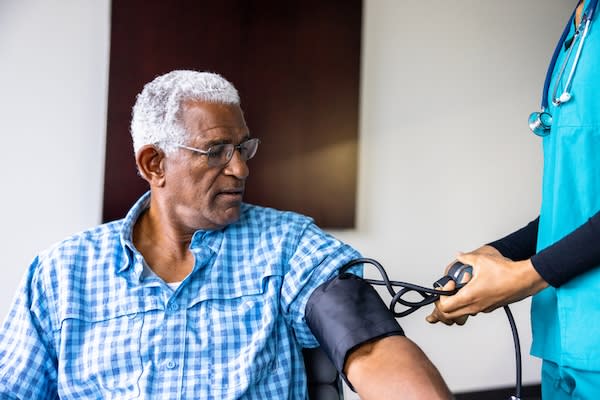We SHARE in advocacy and leadership for the common good

[7 MIN READ]
In this article:
-
We SHARE is our advocacy and leadership framework through which we view all new policies related to environmental stewardship.
-
The advocacy leadership team at Providence partners with lawmakers and organizations to advocate for our most vulnerable populations.
-
Use our resources, toolkits and reports for inspiration and support.
We SHARE in advocacy and leadership for the common good
Teddi McGuire, program manager of government affairs in Washington at Providence, is a new mom.
“Now I’m really faced with this stark reality of the next generation and what earth they’re going to inherit,” she says.
To that end, McGuire takes pride in her role as environmental stewardship liaison to the advocacy team at Providence.
“The environmental stewardship umbrella is very important to me, especially how it funnels down into environmental justice and health equity,” she says. “For me, that’s where all these things coalesce.”
This type of work often requires McGuire to ask important questions.
“How do we reconcile the fact that our work results in a lot of greenhouse gas emissions?” she says. “How are we impacting neighborhoods around us or communities at large? How do we ensure that health equity is present in every policy? We want to make sure that while writing policy, we’re not leaving somebody out unintentionally.”
Our government affairs and advocacy teams care for our common home by partnering with community members, lawmakers and health systems to promote environmental stewardship and climate justice. Here’s how we support and guide changemakers in adopting environmentally sound practices for a healthier and more sustainable world.
Understanding the We SHARE framework
Our efforts to mitigate the impacts of climate change and work toward carbon negative can be viewed through the lens of three pillars: WE ACT, with a focus on mitigation; We REACH, with a focus on adaptation and resilience and We SHARE, with a focus on advocacy and leadership. The We SHARE framework has five elements:
- Service: We aim to empower communities by providing resources and support to enhance climate change resilience.
- Health: We create initiatives focused on minimizing climate-related health risks, particularly for vulnerable and underrepresented communities.
- Advocacy: We collaborate with national and global agencies and organizations to advance environmental stewardship standards in the health care sector.
- Relationships: We work closely with national and local organizations to strengthen community resilience and capacity to respond to climate emergencies.
- Education: We share knowledge and best practices through publications and tools at the Providence Center for Environmental Stewardship.
What advocacy means to us
Our advocacy is grounded in our belief that health and well-being are human rights. We partner with lawmakers at the federal, state and local levels. We work hard to advance policies designed to better serve vulnerable populations, promote social and environmental justice, reduce our carbon footprint and strengthen the health care workforce.
“A lot of it is just hitting the pavement,” McGuire says. “You’re talking to legislators and trying to communicate how a bill could impact hospitals.”
Sometimes, this means supporting a bill that, for example, promotes energy efficiency. Other times, it means recognizing a bill’s intent and finding ways to improve it.
“It’s collaborative,” McGuire says. “It’s working with our subject matter experts, council members, leaders and other health systems not to find ways around it, but through it. Can we get rid of that provision? Is there language that we can use to improve the intent? What does that mean for caregivers when we have to implement it? Sometimes it’s so technical, but it matters – words matter.”
The root of our advocacy work is in our vision: Health for a Better World.
“Some of the best people I know are on the ground trying to help our patients and our community,” McGuire says. “I find value in being able to do this work for them, advocating for certain policies and advocating for our communities, patients and workers.”
Take Seattle’s Fresh Bucks program, for example. Since 2012, this program has helped give more than 12,000 Seattle households access to fruits and vegetables.
“Lower-income families can qualify for the program, and they can spend their Fresh Bucks at their local farmers’ market,” McGuire says. “It’s tied to environmental justice by providing access to fresh produce when you don’t have a grocery store within a mile of your home.”
While working to help solve the problem of food deserts, the Fresh Bucks program also helped to incentivize community members to shop at their local farmers’ markets, which is a boon to farms.
“All of it is connected,” McGuire says. “If these programs are cut, our local farms feel it. That’s where our advocacy can play a role. If there’s a policy out there that maybe wouldn’t directly impact Providence but would directly impact our broader goals, we can come in and do what we need to take a stance on it.”
Broader goals also mean bills, laws and policies, ensuring everyone follows the same standards while working to reduce reliance on fossil fuels and carbon emissions.
“We can do work to improve our facilities and the way we provide for our communities, but if the rest of the state is not beholden to these same efforts, then, collectively, we’re not going to go anywhere,” McGuire says. “If we go two steps forward and the rest of the state is pulling everybody three steps back, we are not making progress.”
Our 2025-2026 advocacy agenda
Each year, Providence leadership establishes a new advocacy agenda. It serves as a reminder of our broader set of goals and gives each state’s advocacy team a lens to look at all bills in the same light. This year’s agenda focuses on:
- Preserving affordable access to care
- Improving health system sustainability
- Strengthening and developing our workforce
- Advancing care delivery and innovation
- Promoting social and environmental justice
“There’s a lot of overlap for us in our advocacy work between social justice and environmental justice, health disparities and health equity,” McGuire says.
For example, advocacy work in promoting social and environmental justice includes:
- Advancing health equity: Supporting policies to address inequities in health care delivery, especially for underserved populations, including immigrants
- Addressing social determinants of health: Improving access to housing, transportation, healthy food, education and employment
- Improving stewardship of our environment: Increasing funding and supporting policies to decarbonize the health care sector and address environmental justice and climate resiliency
Sometimes, new bills are introduced that include work Providence is doing or has already done. For example, the state of Washington is revisiting a bill that could prohibit the manufacture, sale or use of specific, highly polluting anesthetic gasses.
“I think it has a pretty good chance of passing,” McGuire says. “And we’ve already done the work. It’s exciting to see some acknowledgment of the work already happening. And I think, in the grand scheme of things for hospitals and health systems, it’s a lower-hanging fruit. People know that there are better options out there. They sometimes need that push to say, ‘OK, now we have to do it.’ Or sometimes, when it’s written down on paper, it’s like, ‘OK, now we have a reason to put that money to the side even though we were going to do it anyway.’ It shifts priorities for spending depending on what comes up.”
Environmental Stewardship leadership and partnerships
Our environmental stewardship leadership team has been involved in many advocacy organizations and partnerships, some examples include:
- Serving as Washington Department of Commerce Clean Buildings work group advisor
- Providing public testimony during rulemaking for HB 1390, a decarbonization plan for the state of Washington
- Speaking at the House Ways and Means Committee Hearings on Preparing Health Infrastructure for the Climate Crisis
- Attending National Advocacy Day in Washington D.C. in alignment with Health Care Without Harm
- Serving as an expert on the American Academy of Nursing Environmental and Public Health expert panel
- Being a part of Healthcare Without Harm’s Healthcare Climate Council
- Being a member of the National Academy of Medicine’s Healthcare Delivery and the American Nurses Association’s Climate Change Position Statement work groups
- Signing the U.S. Department of Health and Human Services Health Sector Climate Pledge
And we’ve made early commitments to various sustainability programs, including:
- The Joint Commission Sustainable Healthcare Certification Program
- America Is All In
- Race to Zero
- The Health Care Sector Climate Pledge
Committees, organizations and partnerships often work as a coalition that serves the best interests of hospitals and their communities.
“As far as advocacy goes, each of these groups can be the face, be the convener, because of their sole focus,” McGuire says. “They can reach out to their partners and members for information. We don’t always have to be the face of a lot of advocacy because coalitions are better.”
Health systems also only have so much bandwidth. Trusted partners help lessen the load.
Sharing toolkits, resources and reports
At Providence, we are dedicated to transparency and sharing progress. Our Climate Action Plan and Environmental Social Governance reports provide insights into our challenges and successes. We also offer a variety of toolkits designed to empower others to implement environmentally sustainable practices in health care. These include our:
- Nitrous Oxide Toolkit, which provides tools for reducing nitrous oxide emissions in health care settings
- Waste Optimization Toolkit, which provides strategies for minimizing waste and enhancing sustainability
- Green Team Toolkit, which offers guidance for forming teams to drive environmental initiatives
- Environmental Stewardship Strategy & Planning Toolkit, which serves as a mechanism for sharing our learnings around environmental stewardship strategies
We invite everyone to use these resources to learn alongside us. And we invite everyone to learn more at the Providence Center for Environmental Stewardship.
Contributing caregiver

Teddi McGuire is program manager of government affairs in Washington at Providence.
Find a doctor
If you are looking for a primary care provider, you can search for one who’s right for you in our provider directory.
Download the Providence app
It’s all in the app: easily stay connected with Providence and your health. With the Providence app, you can schedule appointments, have virtual visits from the comfort of your own home, get health recommendations personalized for you, access your health records and so much more. Learn more and download the app.
Related resources
Looking forward: 2025 and beyond
Living our mission while planning for the future
Climate justice is a health issue
This information is not intended as a substitute for professional medical care. Always follow your health care professional’s instructions.



